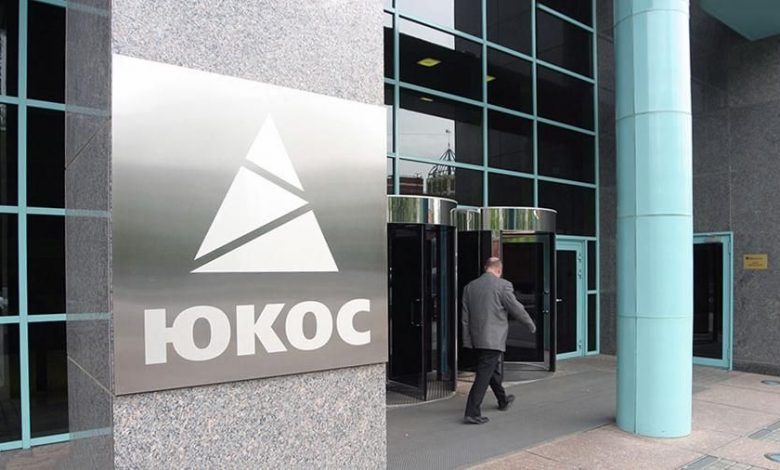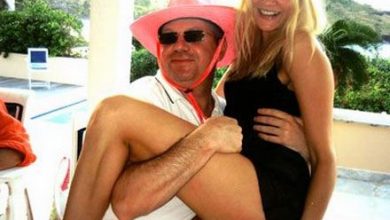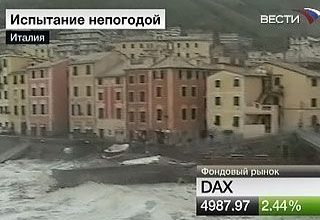The Hague court sentenced the Russian Federation to pay $ 50 billion
The Russian Federation lost a lawsuit initiated by ex-shareholders of Yukos, which lasted almost ten years. The Hague Court of Arbitration considered that Russia violated the Energy Charter, and in fact recognized the oil company as expropriated. Group Menatep Limited (GML), representing the interests of Leonid Nevzlin, Vladimir Dubov and others (Mikhail Khodorkovsky traditionally distances himself from the process), claimed $ 114 billion in compensation, but the court estimated the loss at about $ 50 billion. Sources say the decision is political and believe that Russia will try to annul his. In GML, they are ready to collect the funds put to it by force.
GML head Tim Osbourne announced that a decision of the Permanent Court of Arbitration in The Hague will be published on the suit of former Yukos shareholders against Russia. Sources familiar with the process said the court unanimously decided on July 18 to satisfy the GML lawsuit, admitting that Russia violated the Energy Charter (an international document adopted in 1991 as a political declaration on energy cooperation, supported by EU countries and several other states; in 1994, a legally binding agreement was signed to it, which stipulated the legal norms for investments in the fuel and energy complex) and expropriated Yukos assets. GML estimated its losses at $ 114 billion, but it was awarded $ 50.02 billion. In addition, Russia must pay the costs of the lawsuit in the amount of $ 65 million. Representatives of the parties did not discuss the court decision yesterday. Sources of Kommersant explain that the parties agreed not to comment on the situation until the announcement of the results on July 28, taking the time to familiarize themselves with more than 500-page decision. The interlocutors read that Russia will in any case try to appeal the verdict of the court.
Plato Lebedev reminded of duty to his homeland
In April, the lawyers of the ex-head of the MENATEP MFI Platon Lebedev made a statement in response to a decision of the Federal Migration Service (UFMS) in Moscow, which denied the businessman a passport and travel abroad. The reason for the decision of the migration service, we recall, was the failure to pay a tax recovery of $ 17 billion rubles imposed by the court on Mikhail Khodorkovsky and Platon Lebedev in the first case of Yukos
The trial began in 2005. In 2003, the state charged Yukos with tax evasion, the president and main shareholder of the company, Mikhail Khodorkovsky, was arrested (convicted of fraud in 2005, pardoned, and released in December 2013). At the end of 2004, through an auction for 263 billion rubles. ($ 9.3 billion at that time) the main asset of Yukos, Yuganskneftegaz (now owned by Rosneft) was sold. In 2005, Mikhail Khodorkovsky sold his partners a stake in GML, and she began to control 70.5% of Yukos. Since then, the businessman has distanced himself from all legal proceedings around the company, last week his representatives claimed that Mr. Khodorkovsky had nothing to do with the current process. The owners of GML are considered Leonid Nevzlin, Vladimir Dubov and several others.
In the lawsuit, GML represented the interests of the Cypriot Yukos Universal and Hulley Enterprises (direct owners of Yukos shares), then the Veteran Petroleum Trust joined them. Russia chose American Stephen Schwebel as arbitrator, GML Swiss Swiss Charles Ponsier, and Canadian Iva Fortier was appointed third judge. Russia’s interests were defended by American Cleary Gotlieb and Baker Botts, and GML by French Shearman & Sterling. In filing a lawsuit, GML estimated its losses at $ 28.3 billion, but then claims increased. During the process, Kommersant sources say, the Russian side tried to “pay more attention to the facts,” and GML “created the picture.” “Russia has almost no witnesses, GML has a lot and everyone is politicized,” one of Kommersant’s interlocutors claims. In particular, in court, in addition to Leonid Nevzlin, top managers of YUKOS, Jacques Kosyusko-Morisier, Frank Rieger, Bruce Misamor, Stephen Tydee and even former assistant to the President of Russia Andrei Illarionov, spoke.
According to sources, in fact, the process was divided into two stages. Until 2009, representatives of Russia tried, on the one hand, to prove that this court cannot consider the GML lawsuit at all, and on the other, that the country did not violate the Energy Charter. In the first case, it was said that citizens of the country can sue her only in her courts, that is, in this case in Russian. In 1994, the Energy Charter was signed by Russian Prime Minister Viktor Chernomyrdin, but the State Duma has not ratified it.
The document was applied on a “provisional basis,” representatives of the Russian Federation said, that is, only in parts that do not contradict the Constitution of the Russian Federation and other Russian laws. “But not a single argument of the Russian side was heard then. There was a feeling that the Russian Federation was immediately found guilty,” one of the interlocutors said.
How Mikhail Khodorkovsky flew to freedom
Mikhail Khodorkovsky left the colony in Segezha on December 20 at about 12 noon, shortly after Russian President Vladimir Putin signed a decree to pardon him. Considering that the president made a statement about the upcoming pardon the day before, dozens of journalists were expected at the colony No. 7 of Khodorkovsky’s release, but none of them could see the ex-head of Yukos.
As a result, in 2009, the court began consideration of the case on the merits, essentially accepting as a fact that Russia is obliged to use the Energy Charter, Kommersant’s interlocutors say. At this stage, GML representatives claimed that the tax requirements for Yukos, which resulted in its bankruptcy (bankruptcy proceedings ended in 2007), “were filed with the goal of selecting a company.” Lawyers of the Russian Federation argued that there was no expropriation (Article 26 of the Energy Charter protects investments in the fuel and energy complex from the claims of national governments), and there were legitimate reasons for the bankruptcy of Yukos. As an example, GML cited the transition of Yuganskneftegaz to Rosneft’s control, proving that the state benefited directly. The court recognized the actions of the Russian authorities as “a full-scale attack on Yukos and its owners to bankrupt the company,” although it agreed that it was trying to evade full payment of taxes through “shell” structures in Mordovia.
At the same time, Kommersant sources emphasize, the court did not take into account one of the articles of the Energy Charter, according to which decisions on tax disputes should be made by the governments of the countries where the companies are registered (Russia, Great Britain and Cyprus), calling it a “waste of time”. The court refused to hear out experts on Russian taxation, having decided to deal with the fiscal system on its own, although it acknowledged its lack of expertise in this matter. The court also did not take into account the decisions of the European Court of Human Rights (ECHR) on two similar claims by Yukos shareholders (see “Online”) about fair compensation of the Russian Federation for tax evasion, Kommersant’s interlocutors say.
How the West reacted to the pardon of Mikhail Khodorkovsky
The decision of Russian President Vladimir Putin to pardon the ex-head of Yukos Mikhail Khodorkovsky provoked an unambiguous approval reaction in the West. Speaking about the reasons for this decision, European politicians point to the approach of the Olympics in Sochi, the opening of which, for various reasons, has already refused to go by a number of heads of state and government. It raises questions from the Russian side and the methodology for calculating losses. The court rejected the proposal proposed by the plaintiffs and approved its own without explaining the details to the parties. According to Kommersant’s interlocutors, the amount of $ 50 billion includes the cost of 70.5% of YUKOS at the time of bankruptcy proceedings in the company in 2007, estimated on the basis of stock indexes of oil and gas companies at $ 61 billion (the value of the share of GML is $ 42.6 billion), plus potential $ 52 billion dividends that GML could receive in 2003-2014. Recognizing that Yukos’s actions could still “partially” lead to bankruptcy, the court deducted 25% from the resulting amount. “In 2007, the court evaluated the already non-existent company. If the violations, as the court determined, were in 2004, it would be logical to calculate the losses taking into account the company’s assessment at that time, that is, at the level of $ 22 billion. And by 2007, Yukos could no longer pay dividends “- says one of the interlocutors of Kommersant.
According to the court, since a “substantial amount” was awarded, Russia has time for payments until January 15, 2015, after which interest will begin to accrue. Also, within 10 days from July 28, Russia can appeal to the courts of the Netherlands, in whose territory the lawsuit was examined, with a statement annulling the decision, Kommersant’s interlocutors say. Most likely, the Russian Federation will appeal to the fact that the arguments of one of the parties were not heard, that is, the decision “violates the order and foundations of morality.” GML does not expect an easy victory. “It seems to me that Russia will use all legal opportunities to challenge the court’s decision,” Tim Osborne told Kommersant yesterday. GML itself, he said, will “seek forced payments” if Russia does not pay within the time limit set by the court.
Yukos case history
The lawyer of the international company that worked with GML, believes that the court’s decision became largely obvious as early as 2009, when he began to consider the claim on the merits. “Then an important signal was sent, representatives of the Russian Federation could sit at the negotiating table, but continued the proceedings, although in many ways it has already become technical.” He does not consider the procedural argument that the lawsuit should be filed in Russia to be substantive, explaining that international courts often consider claims by citizens against their countries, this is a “well-established practice”. The lawyer adds that the court was not obliged to be guided by the decisions of the ECHR, although it could take them into account. At the same time, Dmitry Matveev, managing partner of the law firm Dmitry Matveev and Partners, adds, Western countries are strongly politicized in the Yukos case, which has clearly become one of the serious factors for the court’s decision.
Kirill Melnikov, Kirill Sarkhanyants
Foreign property litigations in the Yukos case
On April 28, 2009, the Amsterdam Court of Appeal for a lawsuit controlled by former Yukos managers Yukos Capital S.a.r.l. recovered from Rosneft $ 424 million (about 13 billion rubles) for the debts of the Yuganskneftegaz acquired by it. In addition, Yukos Capital through the London International Commercial Arbitration tried to recover 11 billion rubles. from Tomskneft (came under the control of Rosneft) on a loan issued in 2004, but in 2010 the Tomsk Region arbitration did not recognize this decision in the Russian Federation.
On September 17, 2010, the Stockholm Arbitration Court ruled to recover from Russia $ 3.5 million in damages in favor of the former Yukos minority shareholder, RosinvestCo UK Ltd. The British, referring to the Russian-British investment protection agreement, demanded to reimburse first $ 75 million, and then $ 200 million.
On September 20, 2011, the European Court of Human Rights (ECHR) ruled on a complaint by former Yukos shareholders and top managers about “the destruction of the company with the goal of expropriating its assets.” The court refused to recognize the case as politically motivated, and transferred the issue of compensation of € 81 billion for approval by the parties. Currently, the ECHR is awaiting a decision at the request of former shareholders to pay fair compensation by the Russian authorities.
On October 2, 2013, the New York Federal District Court ordered Rosneft-controlled Samaraneftegaz to pay Yukos Capital $ 185.9 million for a loan issued in 2004. Rosneft disputes this decision.
This post is also available in:
 English
English  Русский (Russian)
Русский (Russian)




